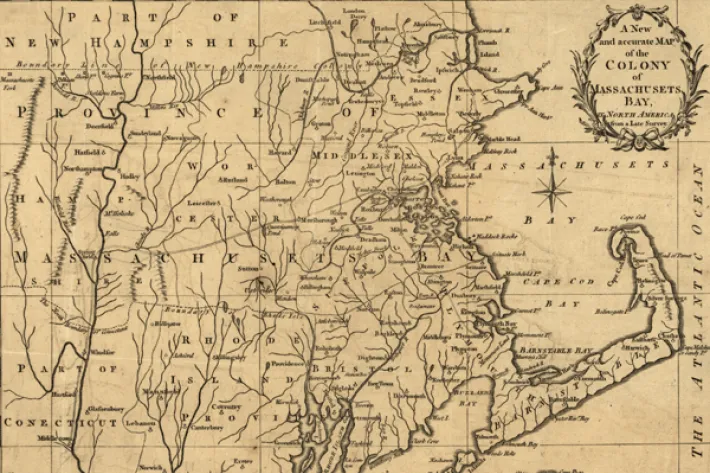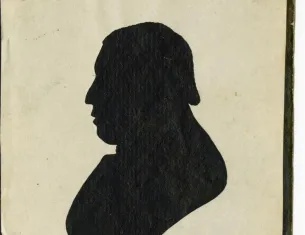Petition against Taxation without Representation for Free Black Men, 1780

A New and Accurate Map of the Colony of Massachusets, 1780 (Library of Congress)
The cry of no taxation without representation struck a nerve with Paul Cuffe and his brother in 1780. As black men, they did not have the right to vote, even though, as businessmen, they paid taxes. Cuffe and his brother refused to pay taxes and sent a petition to the General Court of Massachusetts to for relief from taxation on behalf of free blacks.
A Petition from Paul Cuffe et al. for Relief from Taxation without Representation, 1780
To the Honorable Council and House of Representatives, in General Court assembled, for the State of the Massachusetts Bay, in New England:
The petition of several poor negroes and mulattoes, who are inhabitants of the town of Dartmouth, humbly showeth,–
That we being chiefly of the African extract, and by reason of long bondage and hard slavery, we have been deprived of enjoying the profits of our labor or the advantage of inheriting estates from our parents, as our neighbors the white people do, having some of us not long enjoyed our own freedom; yet of late, contrary to the invariable custom and practice of the country, we have been, and now are, taxed both in our polls and that small pittance of estate which, through much hard labor and industry, we have got together to sustain ourselves and families withall. We apprehend it, therefore, to be hard usage, and will doubtless (if continued) reduce us to a state of beggary, whereby we shall become a burthen to others, if not timely prevented by the interposition of your justice and power.
Your petitioners further show, that we apprehend ourselves to be aggrieved, in that, while we are not allowed the privilege of freemen of the State, having no vote or influence in the election of those that tax us, yet many of our colour (as is well known) have cheerfully entered the field of battle in the defence of the common cause, and that (as we conceive) against a similar exertion of power (in regard to taxation), too well known to need a recital in this place.
We most humbly request, therefore, that you would take our unhappy case into your serious consideration, and, in your wisdom and power, grant us relief from taxation, while under our present depressed circumstances; and your poor petitioners, as in duty bound, shall ever pray, &c.
JOHN CUFFE,
ADVENTUR CHILD
PAUL CUFFE
SAMUEL X GRAY, his mark
PERO X HOWLAND, his mark
PERO X RUSSELL, his mark
PERO COGGESHALL.
Source: William Cooper Nell, The Colored Patriots of the American Revolution, With Sketches of Several Distinguished Colored Persons: To Which Is Added a Brief Survey of the Condition and Prospects of Colored Americans, 1855.
A Petition from Paul Cuffe et al. for Relief from Taxation without Representation, 1780
To the Honorable Council and House of Representatives, in General Court assembled, for the State of the Massachusetts Bay, in New England:
The petition of several poor negroes and mulattoes, who are inhabitants of the town of Dartmouth, humbly showeth,–
That we being chiefly of the African extract, and by reason of long bondage and hard slavery, we have been deprived of enjoying the profits of our labor or the advantage of inheriting estates from our parents, as our neighbors the white people do, having some of us not long enjoyed our own freedom; yet of late, contrary to the invariable custom and practice of the country, we have been, and now are, taxed both in our polls and that small pittance of estate which, through much hard labor and industry, we have got together to sustain ourselves and families withall. We apprehend it, therefore, to be hard usage, and will doubtless (if continued) reduce us to a state of beggary, whereby we shall become a burthen to others, if not timely prevented by the interposition of your justice and power.
Your petitioners further show, that we apprehend ourselves to be aggrieved, in that, while we are not allowed the privilege of freemen of the State, having no vote or influence in the election of those that tax us, yet many of our colour (as is well known) have cheerfully entered the field of battle in the defence of the common cause, and that (as we conceive) against a similar exertion of power (in regard to taxation), too well known to need a recital in this place.
We most humbly request, therefore, that you would take our unhappy case into your serious consideration, and, in your wisdom and power, grant us relief from taxation, while under our present depressed circumstances; and your poor petitioners, as in duty bound, shall ever pray, &c.
JOHN CUFFE,
ADVENTUR CHILD,
PAUL CUFFE,
SAMUEL X GRAY, his mark
PERO X HOWLAND, his mark
PERO X RUSSELL, his mark
PERO COGGESHALL.
Source: William Cooper Nell, The Colored Patriots of the American Revolution, With Sketches of Several Distinguished Colored Persons: To Which Is Added a Brief Survey of the Condition and Prospects of Colored Americans, 1855.
invariable - never changing
pittance - a very small amount
burthen - old form of the word burden
interposition - help
aggrieved - feeling resentment at having been unfairly treated
Background
The cry of no taxation without representation struck a nerve with Paul Cuffe and his brother in 1780. As black men, they did not have the right to vote, even though, as businessmen, they paid taxes. Cuffe and his brother refused to pay taxes and sent a petition to the General Court of Massachusetts to for relief from taxation on behalf of free blacks.
Transcript
A Petition from Paul Cuffe et al. for Relief from Taxation without Representation, 1780
To the Honorable Council and House of Representatives, in General Court assembled, for the State of the Massachusetts Bay, in New England:
The petition of several poor negroes and mulattoes, who are inhabitants of the town of Dartmouth, humbly showeth,–
That we being chiefly of the African extract, and by reason of long bondage and hard slavery, we have been deprived of enjoying the profits of our labor or the advantage of inheriting estates from our parents, as our neighbors the white people do, having some of us not long enjoyed our own freedom; yet of late, contrary to the invariable custom and practice of the country, we have been, and now are, taxed both in our polls and that small pittance of estate which, through much hard labor and industry, we have got together to sustain ourselves and families withall. We apprehend it, therefore, to be hard usage, and will doubtless (if continued) reduce us to a state of beggary, whereby we shall become a burthen to others, if not timely prevented by the interposition of your justice and power.
Your petitioners further show, that we apprehend ourselves to be aggrieved, in that, while we are not allowed the privilege of freemen of the State, having no vote or influence in the election of those that tax us, yet many of our colour (as is well known) have cheerfully entered the field of battle in the defence of the common cause, and that (as we conceive) against a similar exertion of power (in regard to taxation), too well known to need a recital in this place.
We most humbly request, therefore, that you would take our unhappy case into your serious consideration, and, in your wisdom and power, grant us relief from taxation, while under our present depressed circumstances; and your poor petitioners, as in duty bound, shall ever pray, &c.
JOHN CUFFE,
ADVENTUR CHILD
PAUL CUFFE
SAMUEL X GRAY, his mark
PERO X HOWLAND, his mark
PERO X RUSSELL, his mark
PERO COGGESHALL.
Source: William Cooper Nell, The Colored Patriots of the American Revolution, With Sketches of Several Distinguished Colored Persons: To Which Is Added a Brief Survey of the Condition and Prospects of Colored Americans, 1855.
Excerpt
A Petition from Paul Cuffe et al. for Relief from Taxation without Representation, 1780
To the Honorable Council and House of Representatives, in General Court assembled, for the State of the Massachusetts Bay, in New England:
The petition of several poor negroes and mulattoes, who are inhabitants of the town of Dartmouth, humbly showeth,–
That we being chiefly of the African extract, and by reason of long bondage and hard slavery, we have been deprived of enjoying the profits of our labor or the advantage of inheriting estates from our parents, as our neighbors the white people do, having some of us not long enjoyed our own freedom; yet of late, contrary to the invariable custom and practice of the country, we have been, and now are, taxed both in our polls and that small pittance of estate which, through much hard labor and industry, we have got together to sustain ourselves and families withall. We apprehend it, therefore, to be hard usage, and will doubtless (if continued) reduce us to a state of beggary, whereby we shall become a burthen to others, if not timely prevented by the interposition of your justice and power.
Your petitioners further show, that we apprehend ourselves to be aggrieved, in that, while we are not allowed the privilege of freemen of the State, having no vote or influence in the election of those that tax us, yet many of our colour (as is well known) have cheerfully entered the field of battle in the defence of the common cause, and that (as we conceive) against a similar exertion of power (in regard to taxation), too well known to need a recital in this place.
We most humbly request, therefore, that you would take our unhappy case into your serious consideration, and, in your wisdom and power, grant us relief from taxation, while under our present depressed circumstances; and your poor petitioners, as in duty bound, shall ever pray, &c.
JOHN CUFFE,
ADVENTUR CHILD,
PAUL CUFFE,
SAMUEL X GRAY, his mark
PERO X HOWLAND, his mark
PERO X RUSSELL, his mark
PERO COGGESHALL.
Source: William Cooper Nell, The Colored Patriots of the American Revolution, With Sketches of Several Distinguished Colored Persons: To Which Is Added a Brief Survey of the Condition and Prospects of Colored Americans, 1855.
invariable - never changing
pittance - a very small amount
burthen - old form of the word burden
interposition - help
aggrieved - feeling resentment at having been unfairly treated
